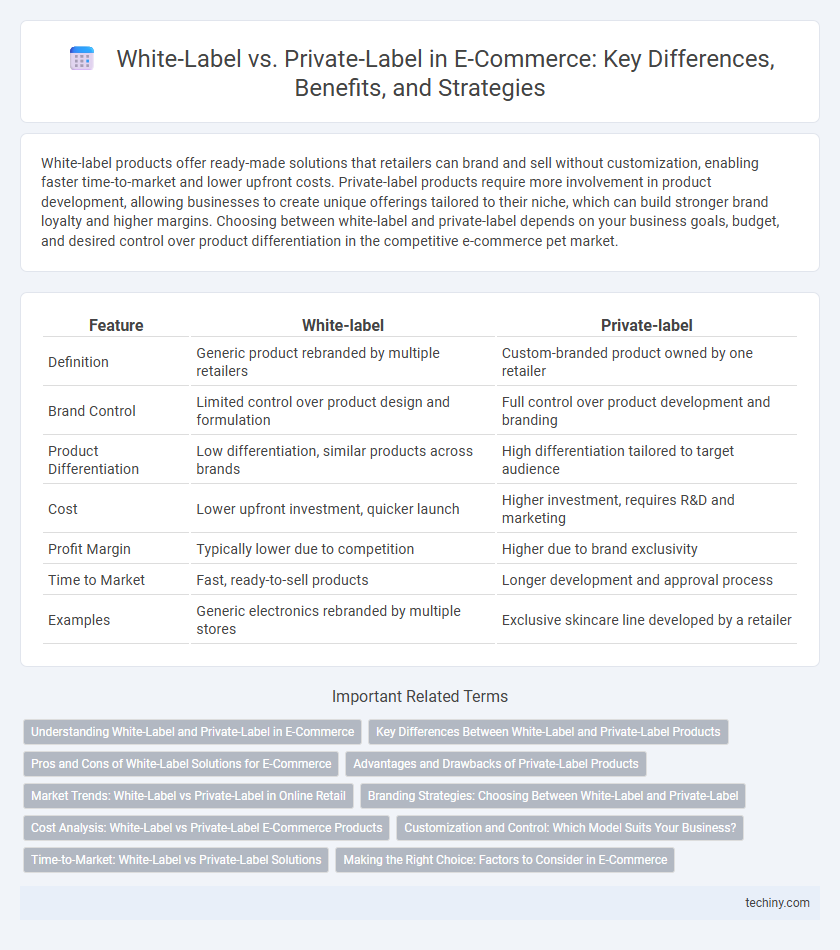White-label products offer ready-made solutions that retailers can brand and sell without customization, enabling faster time-to-market and lower upfront costs. Private-label products require more involvement in product development, allowing businesses to create unique offerings tailored to their niche, which can build stronger brand loyalty and higher margins. Choosing between white-label and private-label depends on your business goals, budget, and desired control over product differentiation in the competitive e-commerce pet market.
Table of Comparison
| Feature | White-label | Private-label |
|---|---|---|
| Definition | Generic product rebranded by multiple retailers | Custom-branded product owned by one retailer |
| Brand Control | Limited control over product design and formulation | Full control over product development and branding |
| Product Differentiation | Low differentiation, similar products across brands | High differentiation tailored to target audience |
| Cost | Lower upfront investment, quicker launch | Higher investment, requires R&D and marketing |
| Profit Margin | Typically lower due to competition | Higher due to brand exclusivity |
| Time to Market | Fast, ready-to-sell products | Longer development and approval process |
| Examples | Generic electronics rebranded by multiple stores | Exclusive skincare line developed by a retailer |
Understanding White-Label and Private-Label in E-Commerce
White-label products in e-commerce are generic goods produced by one company and rebranded by multiple retailers, allowing fast market entry with minimal customization. Private-label products, however, involve exclusive branding and often unique formulations or designs created specifically for a single retailer, fostering stronger brand identity and customer loyalty. Understanding these distinctions helps e-commerce businesses choose between scalable product offerings and differentiated brand strategies to optimize market positioning.
Key Differences Between White-Label and Private-Label Products
White-label products are generic items produced by one company that multiple retailers rebrand and sell as their own, allowing for faster product launch and reduced development costs. Private-label products are custom-made exclusively for a single retailer, offering unique differentiation and greater control over product specifications, quality, and branding. The key differences lie in exclusivity, customization options, and branding control, with private-label providing a tailored approach versus white-label's broad market use.
Pros and Cons of White-Label Solutions for E-Commerce
White-label solutions offer e-commerce businesses the advantage of rapid market entry with established products, reducing development time and costs while enabling brand customization. However, these solutions often limit product differentiation and may lead to competitive challenges due to widespread availability of identical offerings. Dependence on the supplier's quality control and potential constraints on pricing strategy also pose risks for long-term brand loyalty and customer retention.
Advantages and Drawbacks of Private-Label Products
Private-label products offer greater control over branding and pricing, enabling businesses to build customer loyalty and improve profit margins. However, they require significant investment in product development, quality assurance, and inventory management, posing risks for smaller e-commerce operations. Limited market recognition compared to established brands may also challenge initial sales growth and customer trust.
Market Trends: White-Label vs Private-Label in Online Retail
White-label products dominate online retail due to their ready-made, customizable nature, allowing businesses to quickly scale without investing in product development. Private-label products trend upward as retailers seek exclusive branding and higher profit margins by controlling product quality and differentiation. Market data indicates private-label sales in e-commerce grew by over 15% annually, reflecting consumer demand for unique, trusted brands alongside the widespread prevalence of white-label options.
Branding Strategies: Choosing Between White-Label and Private-Label
White-label products allow e-commerce businesses to sell generic items branded under their name, offering quick market entry with minimal product differentiation. Private-label strategies involve creating unique products tailored to the brand's specifications, enhancing exclusivity and customer loyalty. Selecting between white-label and private-label branding hinges on control over product development, differentiation goals, and long-term brand equity growth.
Cost Analysis: White-Label vs Private-Label E-Commerce Products
White-label e-commerce products typically offer lower upfront costs due to shared branding and existing product frameworks, reducing expenses in product development and manufacturing. In contrast, private-label products require higher initial investment for custom design, production, and marketing, but enable greater control over pricing and brand differentiation. Analyzing cost structures reveals white-label's advantage in speed-to-market and affordability, while private-label demands significant capital but often yields higher profit margins and brand equity over time.
Customization and Control: Which Model Suits Your Business?
White-label products offer limited customization, allowing businesses to rebrand existing items with minimal control over features, making them ideal for fast market entry with lower risk. Private-label products provide full control over design, quality, and packaging, enabling businesses to create unique offerings tailored to specific customer needs and brand identity. Choosing between white-label and private-label depends on the desired level of customization, brand differentiation, and investment capacity in product development.
Time-to-Market: White-Label vs Private-Label Solutions
White-label solutions offer faster time-to-market since products are pre-developed and require minimal customization, enabling businesses to launch quickly under their brand. Private-label solutions demand longer lead times due to product design, formulation, and manufacturing processes tailored specifically to a brand's specifications. Choosing between white-label and private-label impacts the speed of market entry, with white-label prioritizing rapid deployment and private-label emphasizing brand uniqueness and customization.
Making the Right Choice: Factors to Consider in E-Commerce
Choosing between white-label and private-label products in e-commerce depends heavily on brand control, customization options, and market differentiation. White-label products offer a quick-to-market solution with limited customization, ideal for businesses prioritizing speed and convenience. Private-label products provide greater branding flexibility and unique product development, which can lead to stronger customer loyalty and higher profit margins.
White-label vs Private-label Infographic

 techiny.com
techiny.com